A competitor website analysis is an important process to receive insights on where your website is positioned for trending search terms.
In order to fully utilize a tool, you need to discover and choose the best tool for your business.
You will learn:
- Why you need to do competitor website analysis.
- The top 5 best tools to discover your keyword gap.
- 4 things & tips to do competitor website analysis effectively.
Finding the relevant keywords for your business is not always an easy task.
Even if your site currently ranks at the top for critical keywords in your portfolio, there’s no guarantee that it can maintain the same position tomorrow, next week, or next month. It’s important to keep an eye on your competitors so you can identify and address threats before it’s too late.
This is where competitor website analysis comes in. By investigating your competitors' working keywords, you can identify your gap and save tons of time finding effective keywords.
This is much more efficient, especially when you use a competitor keyword analysis tool. In this blog, you will find out the importance of doing competitor website analysis and discover the top 5 tools for your business.
Why is competitor website analysis important?
Google processes approximately 63,000 search queries every second. This means that people are coming up with different keywords for search engine questions every second.
We need to research keywords to identify what to optimize the content for. Based on the intent of the keyword, we can determine what information to include on a page so it can rank higher and drive the right traffic.

Doing competitor website analysis is a deep dive into how two or more sites compare in terms of critical SEO factors. A look at how the sites use specific “money” and long-tail keywords is critical to this type of evaluation. A keyword competition analysis provides a complete overview of the industry, including strengths, weaknesses, and opportunities.
Thus, it allows you to discover terms related to a certain topic and uncover their search demand, difficulty score, intent, and more. As a result, you can know more about valuable keywords.
From there, you can create content based on those words and topics, and get in front of your target audience by appearing on the Google SERP.
Top 5 competitor website analysis tools:
With the right tools on deck, you can spend less effort trying to dig on your competitors and more time marketing your product.
RankingGap
Rather than spending too much time trying to spy on your competitors, why not let some smart tools do the legwork for you?
RankingGap has a simple interface and is easy to use. With your domain/URL and the competitor's domain/URL, you can discover your keyword opportunities.
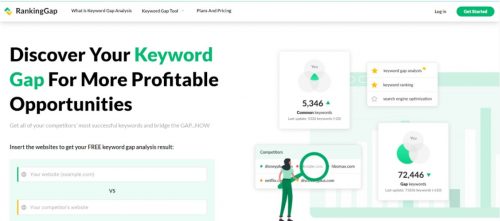
The core feature is to perform a keyword gap analysis on 5 websites simultaneously. The tool has four specially designed keyword views that were crafted to provide users an insightful look into the websites’ keyword profiles: Common, Missing, Gap, and Unique.
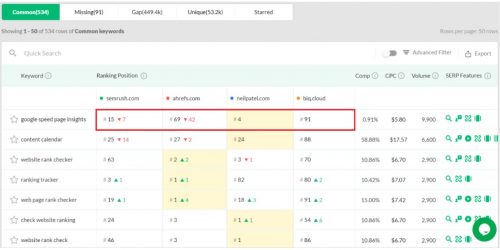
- Common: Identify keywords that both you and your competitors rank for.
- Missing: Reveals keywords that you don’t rank, but all your competitors do.
- Gap: Discover keywords that you don’t rank, but some of your competitors do.
- Unique: View keywords that only you are ranking for, but none of your competitors do.
In addition to this, RankingGap also offers a range of different features. For example:
- Performing keyword and content optimization.
- Knowing what content is missing from your site.
- Discovering the gaps in your competitor’s strategies.
- Analyzing and identifying your website’s strengths, etc.
- Filtering your results to analyze data more easily.
Moreover, RankingGap’s newest feature – Competitor Discovery can even help you with the very first step of identifying your rivals. You can identify potential competitors based on the metrics Opportunities and Traffic Volume.
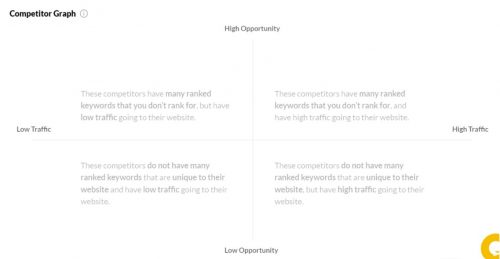
An attractive bubble chart allows you to effectively visualize their competitors based on the web traffic and keyword opportunities at hand. The information provided can let you decide where you want to focus your resources and which competitors you can outrank.
SEMRush
With SEMrush, you can determine how competitors attract traffic so you can capture some of theirs. One of the most valuable pieces of data about your competitor you can get from SEMrush is top organic keywords. This is where you can see the keywords your competitor ranks for particular URLs.
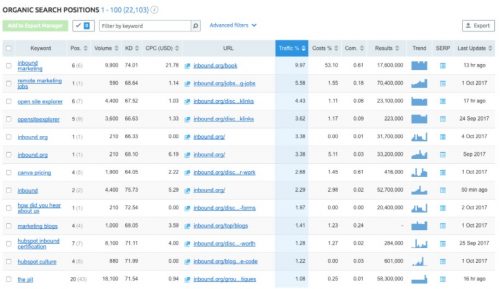
With it, you can gather search data for keyword sets and find additional and competitor keywords. The display of the dashboard presents the keyword information in a visually appealing and easy-to-use format.
Knowing this will help you locate successful keywords your competitors use to rank well in Google and determine whether those keywords are relevant to your niche.
This tool also reveals the competitors’ top pages, keyword strategies, and advertising methods. Moreover, the data can inform your SEO strategy. SEMRush will list your best keyword opportunities, so you can jump right into creating content. Based on insights and recommendations made by SEMrush, you can develop a keyword planner to plan your content distribution.
Ahrefs
When you use Ahrefs, you can check competitors’ backlinks, research their organic traffic, and analyze their paid traffic. Using their Keyword Explorer tool, you can obtain keyword suggestions, search volumes for keywords, and keyword difficulty scores.
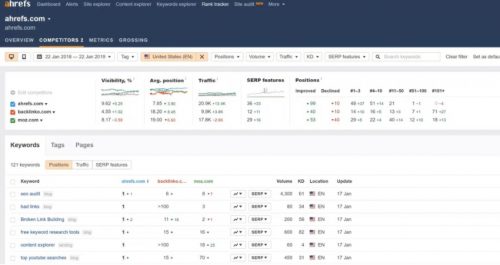
In one simple table, you get access to a huge list of keywords you aren’t making use of. You will also see the search volume, keyword difficulty, and highest-ranking domain right there. In addition, you can add multiple domains to compare against and choose to show only keywords that some or all of them rank for. You can also keep track of all the keywords that matter since the tool monitors over 150 million.
Moz
From domain authority and page authority to keywords and backlinks, Moz has the data you need to stay on top of the competition. This tool also provides a search visibility score to help you benchmark your efforts.
Settled atop your browser, the MozBar is a useful tool to quickly determine a site’s search potential performance at a glance.
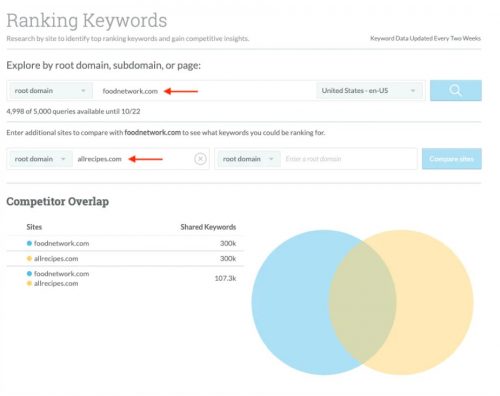
You can download the data as a CSV file and analyze it in a spreadsheet program, or just use the built-in online tool.
It also analyzes page-level keyword gaps, which is really helpful to compare the quality of two pages directly. This will show you extra opportunities you might be missing out on.
You actually only get two searches per day, with a limited amount of data and no exports with the free version.
SpyFu
SpyFu lets you view all data on competitors’ keywords in both organic search and AdWords - and get even more relevant keywords. Then, you just need to add competitors’ keywords and get an overall view of their strategy.
If you’re trying to identify your most aggressive competitors, SpyFu can also give you a list of competitor names for the domain you’re analyzing. It gives you a comprehensive overview of a domain’s performance, such as the distribution of its position on the first page of search results and some other details.
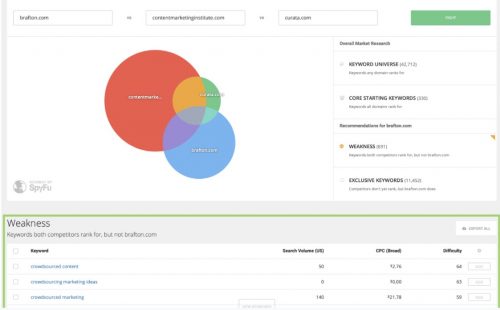
SpyFu gets all of its data by web scraping and refreshing its data on a monthly basis. This gives you a complete rundown of your competition’s digital marketing campaigns. Everything, including purchased keywords, their Google rankings, and information on their keyword strategy, is at your fingertips.
4 things & tips to have an effective competitor website analysis:
4 important works:
Finding the list of keywords is not all you need. You still have some things to keep in mind to do competitor website analysis effectively.
#1. Prioritize keyword opportunities:
Not all phrases you discover during the research can drive significant traffic or rankings. Their popularity can be seasonal, and there is no need to work on them now. Keyword analysis allows you to prioritize opportunities so that you always work on the ones that can deliver the highest conversion.
Thus, 50% of search queries are 4 words or longer. So, do not miss out on the long-tail keywords.
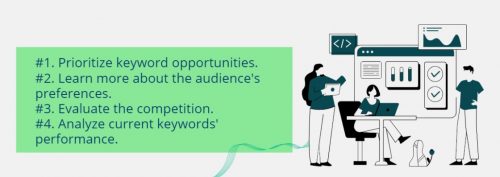
#2. Learn more about the audience's preferences:
Analyzing keyword data like the search volume or CPC cost will reveal much about what engages the audience. You will also discover which keywords are the most relevant to your audience (and why).
In addition, you need to analyze their search intent, which is why people are searching for a keyword.
- Are they looking for information?
- Do they want to buy something?
- Are they looking for a particular website?
If your content doesn’t align with search intent, your chances of ranking are slim to none.
Google understands intent better than anyone, so the top-ranking pages are a great proxy for search intent.
#3. Evaluate the competition:
Keyword analysis uncovers who else targets the keywords, and how likely you are to beat them (or what you need to do in order to beat them).
#4. Analyze current keywords' performance:
The process will also reveal the reasons why certain pages do not perform well for their target keywords and highlight ways to overcome the issue.
4 Tips:
When you’re new to competitive analysis, you might struggle with determining what other domains your website is up against. You should remember these 4 tips.
#1. Review your “money” keywords.
First, pinpoint the sites competing for the keywords that drive the most conversions and the biggest return, otherwise known as “money” keywords. By maintaining your competitive edge against these sites, you can get maximum value from your SEO strategy.
#2. Evaluate long-tail keywords.
Next, focus on sites competing for the same long-tail keywords. On an individual basis, these keywords may generate less value. However, they can have a big impact on your portfolio and SEO strategy as a whole.

#3. Consider niche competitors.
Then delve into the sites that stand out as strong competitors, but only in specific areas. These sites won’t be at the top of your list, but you should still monitor them regularly.
#4. Know which websites to ignore.
Some highly authoritative sites may outrank yours, but if they address a completely different intention or are simply too big or expensive to compete against, don’t waste your resources.
The final step when doing competitor website analysis:
When placing keywords in your content, remember that placing a keyword into the Title Tag doesn’t guarantee a high rank on the 1st SERP. You need to put your keywords throughout the content strategically.
For a page to rank better, you have to use keywords in the following elements:
- Page title;
- Headline;
- Body text;
- URL;
- Images and image alt attributes;
- Internal and external links;
- Meta description; and
- Meta keywords.
Besides posting the content on your own blog, you may also consider publishing content as a press release. And, MarkertersMEDIA - a press release content creation platform can help you with this.
Not only can you optimize your keywords on MarketersMEDIA, but also build your backlinks.
Not limited to analyzing the keyword, competitor website analysis also includes checking backlinks. As a vital part of SEO, understanding your competitors' backlinks helps you gather new ideas for your own link-building strategy. Then, you can benchmark your backlink profiles.
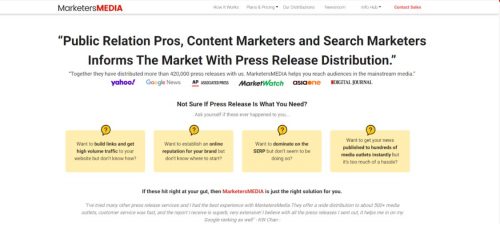
As you discover you and your competitors’ backlink profile status, you will need to keep working on more backlinks (Even when the number of backlinks is more than your rivals!). By featuring on 500+ media outlets, including numerous premium news outlets like Fox, MarketWatch, NBC, StreetInsider, Yahoo! News, etc, you can gain authoritative backlinks.
TL;DR
Competitor website analysis helps increase your page conversions and find new keyword opportunities, but it requires time-consuming examination. The best competitor keyword analysis tool can take the analysis of your website keywords a step further.
From the above 5 tools, you can choose the most suitable for your business. To our best experience, we recommend RankingGap, which has easy-to-use features and a wide range of data.
Free Press Release Template
Tell us where to send your PDF:







